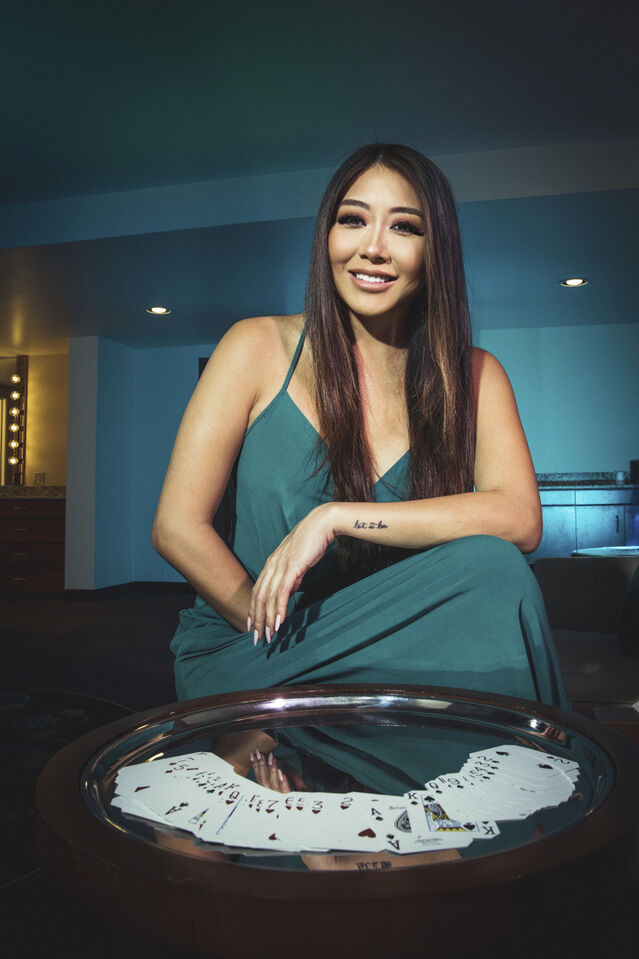Decision-Making
Lessons on Decision Making and Risk Taking from a Professional Poker Player
How Maria Ho learned to let logic rule.
Posted April 28, 2022 Reviewed by Devon Frye

Maria Ho is a top-ranked female poker player. The California native studied communications at the University of California San Diego, where she first dabbled in poker. As a professional, she’s made the final table at five World Series of Poker, been inducted into the Women in Poker Hall of Fame, and racked up more than $4,000,000 in winnings. As she achieved these accolades and others, Ho has gained valuable insights into decision-making, risk-taking, and confidence.
How did you start playing poker?
I grew up enjoying card games and strategy games, but I didn’t find poker until my first year of college. Some guys who lived in my dorm had a Friday night poker game, and for whatever reason, there were never any females invited. That piqued my curiosity, and one day I crashed their poker game. They taught me that night and I picked up on the game quickly. I was hooked, and it didn’t hurt that the first time I played I ended up winning.
I worked myself up from the lower stakes and started playing some of the bigger tournaments. I ended up getting a good score at my first World Series of Poker. That propelled me, and after two years, I decided I was going to pursue poker full time.
What skills helped you achieve success early on?
I’ve always had a good handle on in-person dynamics. And whereas societal norms don't encourage women to be risk takers, I was never risk averse. I was more aggressive than most players around me, especially for a female player.
I was also able to manipulate people’s perceptions of me. It was clear that once people saw me as a non-threatening poker player—because I was a minority or a female in a male-dominated space—they underestimated me. I played into the idea of “I don’t know what I’m doing, I’m not that competitive, I'm here for fun and if I win, great.” I was playing off of their misperceptions of who I was at the poker table, so I got away with a lot.
What body language cues do you look for in your opponents?
I think mainstream media depicts a different picture than what poker players actually use as physical reads. It’s not about a “poker face;” it’s about certain patterns in people’s behaviors that they don’t realize they’re telegraphing. For example, I coach poker and one thing I always tell my students is when the cards are dealt, instead of looking at your hand first, you want to be looking at everyone else while they’re looking at their hands. If someone is interested in their hand, they might physically place their hand over their cards to show ownership, versus getting ready to fold and physically throw the cards back toward the dealer.
Another thing is the way people move their chips forward to bet. When players are taking time to decide, they don’t have an automatic answer. If you have the best starting hand, pocket aces, you know you’ll play it. But if you get a hand that’s mediocre but kind of interesting, maybe a jack and a ten of the same suit, you might play with your chips a certain way as you deliberate.
It’s not that I can look somebody in the eyes and be like, “I know you’re bluffing.” It’s a combination of little things that I’m adding up at every point in the hand to make my final decision.
How do you know when to take a risk?
Poker is a game of limited information. When every piece of information isn’t readily available to you, you have to make quick decisions based on deductions you’ve made throughout the hand. To spot a good situation to bluff, I first have to analyze my opponent. Is my opponent more risk averse than some of the other players at our table? If they are, they're a good candidate for me to bluff against. If they’re not willing to take the risk to call me on my bluff and be wrong, it’s easier for my bluffs to get through a higher percentage of the time.
It’s also about finding a situation where people seem disinterested in the pot. You can sometimes tell by the way a player is sitting upright, or engaged in the cards as they come out, that they have a lot of interest in the hand. Sometimes there will be four to five players involved in a hand, and only one person looks really interested in the outcome. My bluff only needs to work against that one person.
Of course, there’s some game theory calculation when we talk about a good spot to bluff. It’s not all instinctual. Do I have the right cards in my hand? Am I blocking my opponent from making the best possible hand?
How do you decide to take risks in life outside of poker?
When we talk about how poker is a game of limited information, that’s allowed me to not need to have full control or know exactly what’s going to happen, and take that leap of faith. I just need to know I have a justifiable reason for why I want to do this. I teach poker, and I tell my students this: Be intentional. Don't bet for no reason. You have to say, “I bet at this point in the hand because of X, Y, and Z.” That’s what I do with everything else in life. I just need to have a reason in the moment with the information I have. Once I make the best decision, I need to let it go, even when that outcome doesn’t work out.
How else does your decision-making process from poker apply to your life?
Poker has given me more agency to advocate for myself. I am constantly somebody who is seen as an outsider. As far as professional poker goes, it’s only about 3 percent women. I often deal with situations where someone is trying to intimidate me, because intimidation is a big part of the psychological aspect of the game—if they make you feel you don’t belong or aren’t good enough to play, you’ll end up questioning your confidence.
A lot about poker is kind of a negotiation. It’s about if you’re representing a good hand, and how much your betting tells a story. You’re trying to get people to believe you, and that’s how a bluff works. I've had a couple of business ventures as I’ve moved away from poker. I’ve been able to find myself in favorable positions when it comes to negotiating for myself and feeling like when I tell a story from A to Z, it completely makes sense and I’m rationalizing everything I’m saying.
What psychological challenges does poker involve?
This game involves a lot of psychological fortitude because the outcome doesn’t always reflect your effort or skill level. Luck is a part of it. You can make the correct decision at every point in the hand, but you can still end up losing. I think it’s hard for a lot of poker players to let go of the idea of meritocracy, like if you put in the energy and effort, you’ll get paid.
In life, when you touch fire and get burned, you know not to touch it again. But in poker, you have to go back every time and be willing to put your hand in the fire.
Do you ever get fatigued by the mental calculations involved in playing poker?
One-hundred percent. When people think about poker, they probably don’t think you have to be in great condition to play the game. But I have a strict regimen where I meditate in the morning to clear my mind. A tournament can be 10 or 12 hours. Fatigue is common and sets in quickly. You have to be sharp, because one small mistake can cost you the tournament.
It’s not even the fatigue of playing badly—it’s when you go into autopilot but you shouldn’t. You should never rely on a default strategy, because you always need to be adjusting and adapting your strategy to tailor, exploit, and have a counter-strategy to what your opponents are doing.
How do you stay mentally fit?
Meditation and yoga. I work on my breathing a lot. It’s something to hide my tells and my neck pulses. I’m controlling my breathing in situations where I’m bluffing or have a big hand and am excited. People say I have a good poker face. But it’s not my poker face—it’s my breathwork.
On a different note, sports betting has become increasingly popular. What advice do you have for newcomers?
Now that sports betting is more legalized and accessible, people are taking it very seriously. Sports betting is similar to poker in the sense that you’re always trying to take calculated risks. You never want to overextend yourself. You also don't want to be emotionally attached to the outcome, because you’re not in control after you place your bet.




